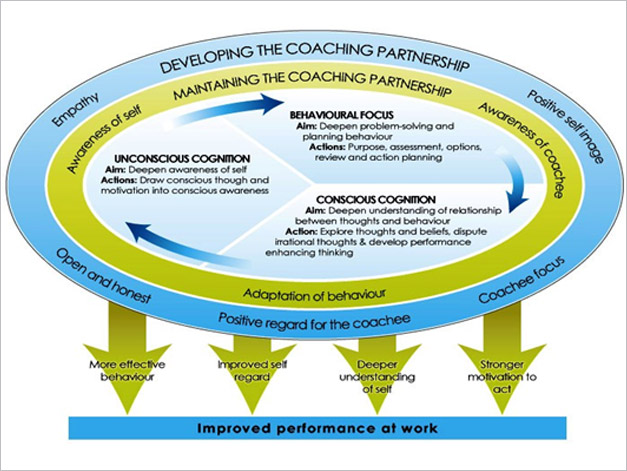Multiple Coaching Models :
At Resonate, we base our methodology on two basic building blocks - Awareness and
Responsibility. Our quest is to build high - level of environment and self - awareness
for our Coachees (the person who is being coached), thus raising their own sensitivity
and alertness to the factors impinging their choices. We believe that a sense of
chosen responsibility (versus given responsibility) for one's words, actions and
learning is the gateway to each individual's leadership expansion.
Our preferred models of coaching are;
Behavioural Coaching – The GROW model :
The GROW model (developed by Sir John Whitmore) is flexible and it allows the coach
and coachee to jump backwards or forwards through the four elements within the session.
- Goal : What do you want?
- Reality : What is happening now?
- Options : What could you do?
- Will : What will you do?
GROW model provides a structured approach to :
Performance Coaching :
Often high - potential and usually high - performing managers and leaders and their
orgnizations, find themselves in a surpising cycle of low performance.The performance
focused approach to coaching is about asking the right questions, about keeping
the coachees focused on what they want to achieve and not what has happened in the
past. The coach approaches the coaching from wanting to discover rather than analyze.
Therefore inquiry into the coachees goals, expectations and resources becomes crucial
in finding a solution.
Appreciative Coaching :
Appreciative Coaching uses the principles of Appreciative Inquiry in the coaching
process and assumes that every individual has untapped, rich, and inspiring accounts
of the positive. Appreciative coaching is based on the belief that we as humans
have the intrinsic capacity to not only be resilient in life but to thrive and flourish.
Appreciative Coaching model is the search for positive through Discovery (discovery
of one's strengths and abilities), Dream (articulating potential and one's future),
Design (directing and action for desired future) and Destiny (seeing and living
the dream in present).
Appreciative Coaching does not ignore problems or difficulties. Rather it attempts
to shift attention to what is the desired future. In view of that future the problems
are resolved or seem to become inconsequential.
Integrative Coaching :
Integrative Coaching model is Resonate's way of weaving systemic and personal change
into building overall capacity of an organization. It consists of six streams that
flow together to form an integrated model to be used by a coach.
- The first two streams work collectively and are concerned with formation
and maintenance of the relationship between coach and coachee.
- The next three streams are the focus of the work between coach and
coachee. They are concerned with coachee's behaviour, his / her conscious thoughts
and unconscious thoughts.
- The final stream is systemic helping coachee to understand the wider
system in which he / she works, its impact on his / her behaviour and vice - versa.
